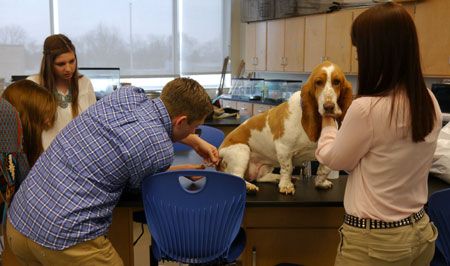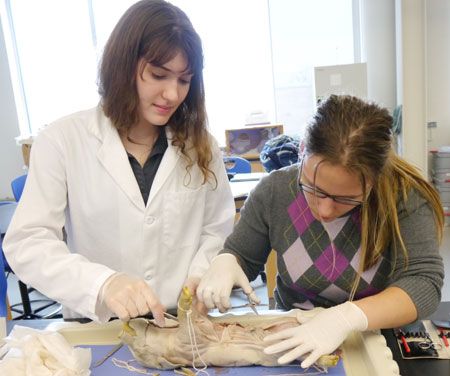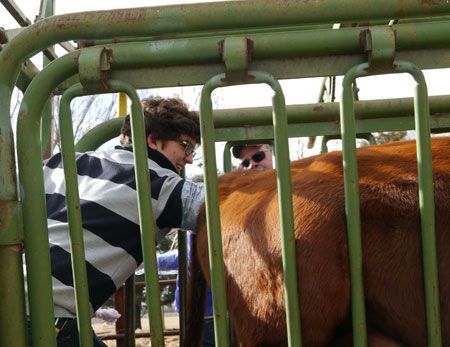Kansas high school program immerses students in veterinary medicine
Mentors and field trips foster deeper understanding of the profession.
The Blue Valley Center for Advanced Professional Studies (CAPS)-a public high school facility spanning approximately 70,000 square feet in Overland Park, Kansas-is offering a new approach to veterinary medical education in the heart of the Animal Health Corridor.
Recently, eight juniors and seniors participating in the program eyed a radiograph of a dog's stomach to find an irregularity before a former practicing veterinarian revealed the problem-a rubber ball was lodged in the intestines. Kyle Malter, DVM, a technical manager with program sponsor Boehringer Ingelheim Vetmedica, was visiting CAPS that day to share his old cases with students.

Students in the Center for Advanced Professional Studies (CAPS) Veterinary Medicine program administer an intramuscular injection to Ginger, the veterinary instructor's basset hound, who has hip dysplasia.The presentation ranged from another radiograph of a dog that swallowed $1.67 in coins-a penny's zinc composition is poisonous to canines, Malter told students-to a comminuted fracture of a dog's humerus bone. Instruments such as rongeurs, retractors and hemostats were introduced and explained. Malter also demonstrated comprehensive wellness exams on two dogs and a cat.
He reviewed orthopedic issues, endocrine and skin disorders and how to take patient histories. He used a stethoscope with two sets of earpieces to listen together with students, and they found an animal's optic nerve with an ophthalmoscope. The students learned about top client questions, common diseases and different surgeries.
Malter says he believes the program gives the students an advantage over their peers if they pursue veterinary school because they'll be familiar with many of the concepts.
“In a nutshell, my impression of the program is overwhelmingly positive, and frankly I wish the opportunity existed for my school when I was at that age,” he told dvm360.

Students in the CAPS Veterinary Program, headquartered in Overland Park, Kansas, dissect a fetal pig.Field trips are a major part of the CAPS learning experience across all programs, which include business, engineering and bioscience courses. The 815 students spend half the school day in the program every day for a semester, and the extra time allows for a deeper understanding of the subjects. The CAPS model has been replicated across the country in Iowa, Arizona, Minnesota, Utah and Nebraska.
Students in the veterinary program have visited Bayer Animal Health in Shawnee, Kansas, and learned about aspects of an industry career, such as marketing, drug development and production, according to the CAPS website. The students engaged in a project to create or improve animal products, producing ideas for stress relievers, an antibacterial cream and dental chews. Students have also visited such places as Shatto Milk Company in Osborn, Missouri, and Swickard Family Farm in Stilwell, Kansas, to see a cattle and grass farm, and they also shadowed the teams at four clinics for a week each to see how practice operations can vary.
Kelley Tuel, CAPS' veterinary medicine instructor, brings her experience as a biology teacher and researcher to the program. During her research for her master's in biology at Emporia State University, she found two undescribed bacterial mutants and named them Halobacterium sp. KBT-1 and sp. KBT-2 (KBT stands for Kansas biology teacher). She is currently pursuing a second master's in veterinary biomedical science and pathobiology.
The CAPS veterinary course, which debuted this year, engages the 25 students more than a traditional class would, Tuel says. “To be in that professional environment and feel that they are respected and that they're welcomed guests is, I think, exciting for them and it makes them feel like they have a foot in the door when they do come back to apply for jobs,” she says.
The program hasn't addressed the financial aspects of a veterinary career yet, but one speaker did broach the topic, Tuel says.

A CAPS student palpates a cow during a field trip. The CAPS Veterinary Medicine program debuted this year.“He talked about [practice] profitability and how to weigh that with the number of animals you have and when the economy fluctuates, so they're seeing that's a common thing they need to learn about,” she says.
Student debt is another issue not yet incorporated, but another speaker asked students to consider the costs of an undergraduate education in-state versus out-of-state combined with the price of veterinary school.
“I think it's important to say, ‘OK, what is important to me, and how [do I] finance that?'” Tuel says.
Jackson Ralston, a senior in the program, said the program has supported his goal to be a veterinarian. “It hasn't changed my view,” he said. “It's really only affirmed it."